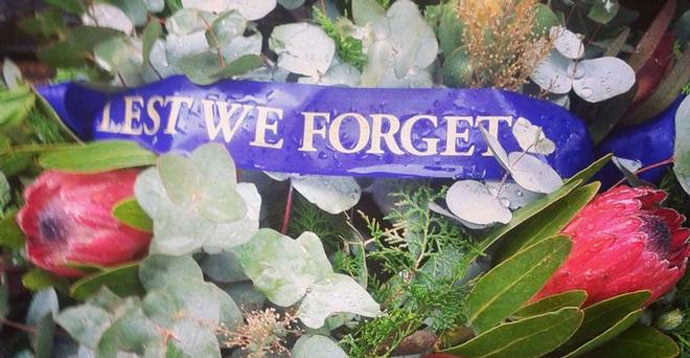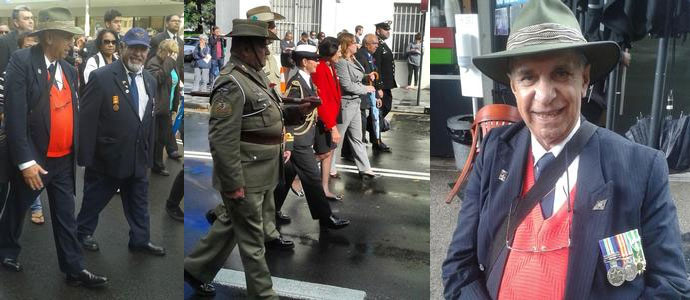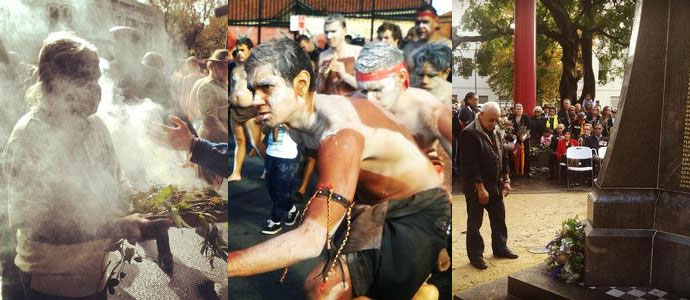ANZAC day: Black Diggers buck the given history of "white men's business"
Like all school children of my vintage we were taught that ANZAC Day was nothing less than sacred when our brave soldiers, sailors and airmen saved us from the Japanese peril and the fascism of Hitler. Of course there was absolutely no mention of any Aborigines or Torres Strait Islanders who fought and no recognition of women either. This war was men's business - white men's business.

Australian leaves and flowers - remembering First Nations Diggers in Redfern 2014
(Images: NITV)
Ray Jackson 29 April 2014

The Black Diggers and Anzac history
By Ray Jackson, President
Indigenous Social Justice Association (ISJA)
Last Friday, Anzac Day, I again made the decision to forgo the main Anzac March in the city as I have done for many years. I have found I could honour my Australian father who was killed on the Kokoda Track during WWII in other, more private ways. His death led to me being taken from my Aboriginal mother. No War Widows' Pension for her, just the taking of her children due solely to her Aboriginality. Such was the thanks for his contribution.
I have, however, been attending the Black Diggers' March that began in 2007. Beginning at the Redfern Park Cenotaph and after the laying of wreaths and some speeches we marched to The Block for more speeches and a feast of pies generously supplied by Harry's Cafe de Wheels.
The most moving moment of the whole event, at least to me, was the Ode and the playing of the Last Post. These words and bugle notes have been with me for many years as I attended the Dawn Services at Martin Place in the city as a child and as a teenager. When I was able to be in the pubs, after the march, I would listen to the diggers who mostly presented in an ambivalent mood. There was the joy, of course, of having survived the horrors of their battles but mixed with a comradely sadness at the loss of mates who had shared the horrors of war. There was however, always laughter.

Elder from Nambucca Heads, Robin Bryant, (left & right) marches with mates at the 2014 Redfern March.
(Images: NITV)
In 2013 I wrote of this phenomenon and I include those words, as I believe they are still very relevant.
I must admit to a proven ambivalence towards ANZAC Day and the celebration or commemoration of that day.
Like all school children of my vintage we were taught that ANZAC Day was nothing less than sacred when our brave soldiers, sailors and airmen saved us from the Japanese peril and the fascism of Hitler. Of course there was absolutely no mention of any Aborigines or Torres Strait Islanders who fought and no recognition of women either. This war was men's business - white men's business. It was the business of our bronzed ANZACs, our diggers whose bravery matched that of our grandfathers who fought and died in WWI. As children we basked in the heroic light of our men who had fought and those that made it home and those that didn't.
Simpson and his donkey who tended to the wounded at Gallipoli was a role model par excellence. The victory in defeat at Gallipoli was hard to understand but we accepted what we were told. We learnt of the total heroism of those who fought in Papua-New Guinea and especially the hell that was the Kokoda Track. My adopted mother's three brothers all returned from the war but never spoke of their actions of bravery and heroism. I could not understand that but then I thought as a child and continued not understanding.
In the hotels, after the marches I heard words tumbled from many lips, some about their part in the war until their less emotionally charged comrades at arms hushed them up. The main words uttered revolved around variations of 'never again.' I continued to grow, to read and to learn.
During my time working in Papua-New Guinea I attended the 'Gunfire Breakfasts' and visited Bomana War Cemetery. At dawn, my memory tells me, Bomana was indeed a beautiful place to be: row after row of white headstones that glinted like broken glass in the early morning light. My only sorrow is that many years later, after I had returned to Australia, I learnt that my birth father had been buried there. I always vowed to go back but never did. I also visited the start of the track at Ower's Corner and walked some distance down the track.
I go into this detail merely to show that the war was on my radar perhaps more than most. My reading and learning continued to the point that I stopped going to the marches. I questioned the meaning of the marches and found that whilst honouring those who had gone to war and those who had died, I could no longer accept the politics of war and wondered why those who did could not see through the futility of war.
Previously I have stated that looking at the wars we have fought for King/Queen and country and the flag, that starting with the Boer War and going to our invasion of Afghanistan, Aborigines have fought in every one of them. In the Boer War up to 7 Aborigines (perhaps even more) were taken to South Africa as trackers and labourers. Whether they wanted to go or agreed to go is a moot point. When the fighting was over the troops came home but they left the Aborigines there. They could not return to Australia due to the laws of the White Australia Policy. They died in South Africa is my understanding.
WWI was nothing less than a European Imperialist war of squabbling royal houses for alleged sleights and land. We should have never been involved. WWII was quite different. This was a war against fascism and as such needed to be fought and won. Thankfully we were part of the winning team. After the end of that war we then became involved in what was termed the Malaysian emergency when Britain attempted to re-rule Malaysia again. Korea, an American-supported war, then followed and it was my task in school every Thursday to compile the war news, abbreviate it and read it to the class. But we should not have been there. Years later I was to meet and socialise with some very scarred Korean War veterans who had fought. They did talk but the cry was the same, 'never again.' Then came our limited involvement in what was termed the Indonesian-Malaysian confrontation. Vietnam tore our country to pieces as we once again followed the USA into war. It was Prime Minister Bob Menzies telling lies at the behest of the USA that got us into that hellhole. Wrongly, some attacked the conscripts and regulars who went to Vietnam but their bile should only have been for the politicians who tricked our young fighters into Vietnam. Then came the criminal invasions of Iraq and Afghanistan: again American wars.
We have either supported British hegemony or American hegemony, except for WWII and it is time that we stood on our own feet. But with Indonesia and China above us with their many hundreds of millions, some of them of the Muslim faith, we will remain cowering in wasp-ish fear and continue seeking a strong protector. Now it is America but they are on the downward slide so the future is indeed interesting.
Since Pastor Ray Minniecon and others around Redfern began the Black Diggers' March some years ago my interest has been piqued to the point that I want to attend that march rather than the mainstream city march. I still honour those who fight and those who die but the day has been turned into a nationalistic feast of rhetoric and bravado whereby war is glorified as a cause worthy of support. Generations on we now stand at ANZAC Cove marvelling at the heroism of our fighting men and the histrionics of the politicians who join them in this worthy endeavour of remembering a war by those who have never fought.
Gallipoli was a disaster, a butchery of defeat led by incompetent English officers. The same butchers who then offered for massacre those in the trenches of France and elsewhere. The only possible glory arising from the stupidity and callousness of war is the survivors whispering, 'never again.'
But I also wish to march this Anzac Day for those who fought and died in the invasion that began in 1788: for all the massacres of my people and the outcomes of that invasion that still attack and kill my people even unto today. I will march for all those Aborigines and Torres Strait Islanders who fought and died fighting for equality and justice but sadly found none. I will march for those who died in all the wars and who still do not get proper and due respect, deserved attention or thanks.
Thankfully, however, because of the profile of the Black Diggers' Marches that is slowly changing.
And I will also march for my Australian birth father who is buried at Bomana War Cemetery in Papua.
But I do not march to glorify war.
Never again.

Elder, Uncle Max, burns eucalyptus leaves, Traditional dancers and laying wreaths at Redfern, 2014.
(Images: NITV)
Returning to this year's Black Diggers' March I do however, find examples of obsequious practices that I personally find very grating but I do have an understanding of why they are done. Hilton Donovan sang the Australian anthem to us twice, once at the Redfern Park Cenotaph and again at The Block. I make a personal decision, as I know other Aborigines do, to not recognise this attempt by government to whitewash our black and white history. At the park we were already upstanding so as Hilton rendered these words of shame I wondered how many of our fallen brothers and sisters would have agreed with the words of this odious work.
I urge all Aborigines to actually read and decode the secret English embedded in this piece. I see nothing of value for our people. It does not even recognise our existence in its words of comfort to the invaders. At the block, as Hilton repeated the words I remained seated: as I did for many years when they played God Save the Queen as the anthem.
We have the usual coterie of political representatives, none of whom have ever wore a uniform or heard a shot fired in anger I will claim, speechifying us with their words and being given the honour of laying wreaths at the Redfern Cenotaph and receiving gifts at the block.
I must state here and now that I do not include the NSW Governor, Professor Marie Bashir with this group of camp followers. The standing ovation given in full honour and respect to her was most deserved and required and I fully endorsed that being done. My honour and respect to Marie goes not to her office but to her personally. Marie is a long time supporter of the Aboriginal struggle and my involvement with her goes back to the early 1990s when she was in charge of health, and mental health issues especially, whilst I was the management committee co-coordinator of the Aboriginal Deaths in Custody Watch Committee. We would meet, along with others, to discuss the health and mental health issues of Aboriginal inmates and young detainees in the incarceration system.
I attempted to congratulate her supportive stand once more but her attention was continually diverted away from my presence by the organisers.
Another irksome practice I find is to give space to some local Aborigines who are identified as being 'leaders' of the Redfern community to strut their stuff so to speak. Like the politicians, I believe none have ever served or heard a shot fired in anger. Neither have I heard a shot fired in anger but I have served in the RAN, however briefly, and the CMF in my younger years. I state unequivocally that I am not 'back-dooring' an application to lay wreaths or get gifts. Most certainly I am not. I just want some sense and reality in the Black Diggers' event. Whilst it may be seen to be correct to get the brigadiers and other military officers of high rank to lay wreaths we must ask where are the lower rank black diggers? Why are they not laying wreaths?
A couple of years ago mention was made, however briefly, of the frontier wars and their most natural inclusion on this day of remembrance whilst wreaths were laid at the Redfern Park Cenotaph. That seems to be no longer practiced. Professor John Maynard at The Block made an excellent contribution on this most important point but the organisers, including Pastor Ray Minniecon, a man I have great respect for in this important area, seem to prefer to now leave their thoughts on the inclusion of the frontier wars to others outside of the organising group. Why? Why is not a wreath laid to the struggle of our warriors, both men and women, who gave their lives fighting for their lands against the invaders?
Why does not Ray, who I know has a deep personal commitment to the frontier wars process, lay that wreath? Perhaps Mark Spinks, the MC of the event, could do so? Why is there now silence at the cenotaph relative to our fallen warriors? Is not the laying of a wreath a proper and respectful recognition of our collective Aboriginal struggle and to those who lost their lives to, and as a result of, that struggle? I would say yes.
Why is there now a strong sense that the political correctness of the black-arm-band construct is now being placed in the dominant position? I assume that the answer is funding: the pipers and tunes scenario. But surely no government funding is really required. I believe that the Black Diggers' event can be produced without the need for government dollars from any level.
It is my understanding that Ray and others, including myself, fully support the inclusion of the frontier wars not only in the main cenotaph in Canberra but also at Redfern and other Aboriginal and Torres Strait Islander events to commemorate our fallen warriors in all the wars our people have fought and died. Another aim is to have a National Aboriginal and Torres Strait Islander War Memorial, at a place yet to be decided. Our own people will manage that national memorial only and we will decide the true history that will be included in that memorial. Our war memorial will remove the white-blindfold and our history of our involvement in all wars will be told, without conditions.
In Canberra, our memorial to our fallen warriors is behind the main memorial up a bush track. Why is it there? In Sydney our Aboriginal Artwork Memorial is also not included in the main memorial building but is to the rear or to the side of that building. Again, why? As in all areas of life, recognition without respect, a proper respect, is truly demeaning. To my mind the racism continues.
Roll on 25th April 2015. Whereby the centenary of a military disaster, defeat and retreat from Gallipoli is to become a nationalistic frenzy as our governments and politicians seek to manufacture a glorification of war over the need for remembrance of the horror of war.
As was said in the 2013 post, never again.
Why does not Ray, who I know has a deep personal commitment to the frontier wars process, lay that wreath? Perhaps Mark Spinks, the MC of the event, could do so? Why is there now silence at the cenotaph relative to our fallen warriors? Is not the laying of a wreath a proper and respectful recognition of our collective Aboriginal struggle and to those who lost their lives to, and as a result of, that struggle? I would say yes.
Why is there now a strong sense that the political correctness of the black-arm-band construct is now being placed in the dominant position? I assume that the answer is funding: the pipers and tunes scenario. But surely no government funding is really required. I believe that the Black Diggers' event can be produced without the need for government dollars from any level.
It is my understanding that Ray and others, including myself, fully support the inclusion of the frontier wars not only in the main cenotaph in Canberra but also at Redfern and other Aboriginal and Torres Strait Islander events to commemorate our fallen warriors in all the wars our people have fought and died. Another aim is to have a National Aboriginal and Torres Strait Islander War Memorial, at a place yet to be decided. Our own people will manage that national memorial only and we will decide the true history that will be included in that memorial. Our war memorial will remove the white-blindfold and our history of our involvement in all wars will be told, without conditions.
In Canberra, our memorial to our fallen warriors is behind the main memorial up a bush track. Why is it there? In Sydney our Aboriginal Artwork Memorial is also not included in the main memorial building but is to the rear or to the side of that building. Again, why? As in all areas of life, recognition without respect, a proper respect, is truly demeaning. To my mind the racism continues.
Roll on 25th April 2015. Whereby the centenary of a military disaster, defeat and retreat from Gallipoli is to become a nationalistic frenzy as our governments and politicians seek to manufacture a glorification of war over the need for remembrance of the horror of war.
As was said in the 2013 post, never again.

